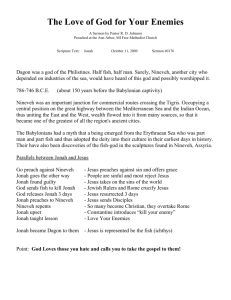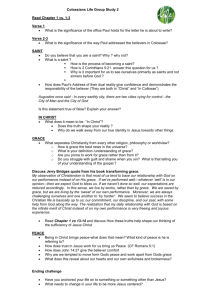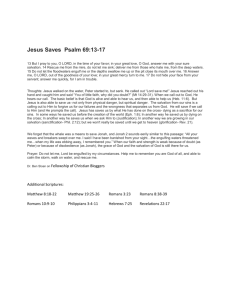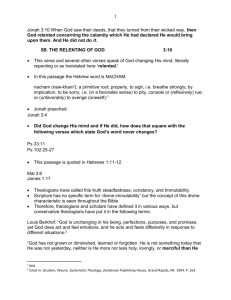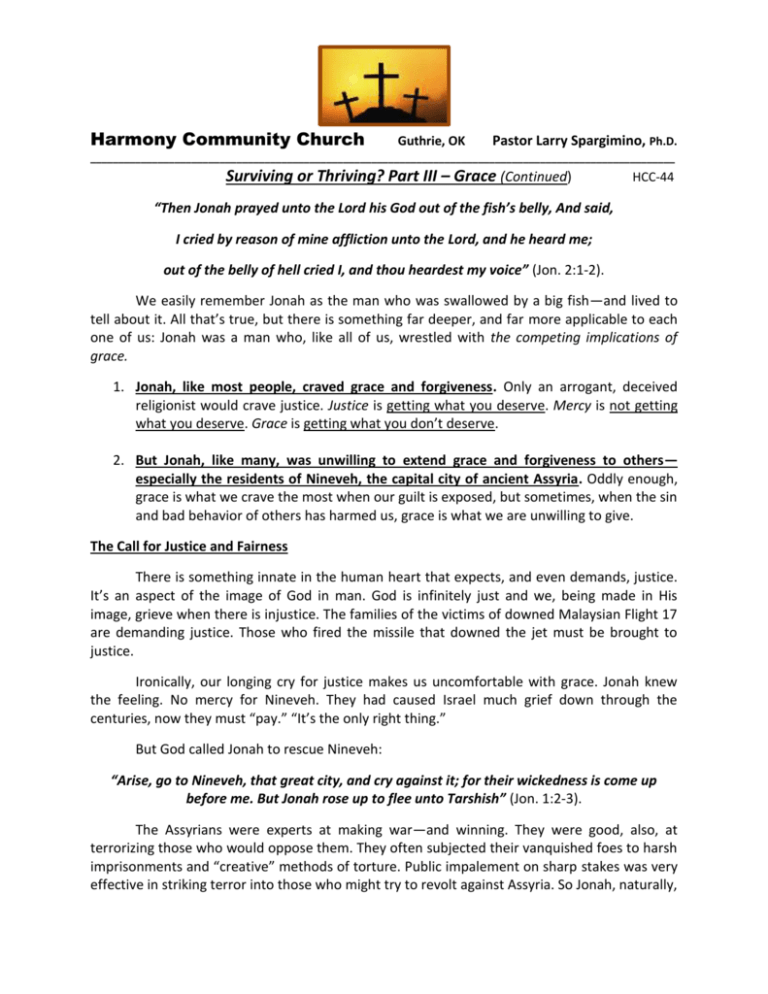
Harmony Community Church
Guthrie, OK
Pastor Larry Spargimino, Ph.D.
________________________________________________________________________________________________________
Surviving or Thriving? Part III – Grace (Continued)
HCC-44
“Then Jonah prayed unto the Lord his God out of the fish’s belly, And said,
I cried by reason of mine affliction unto the Lord, and he heard me;
out of the belly of hell cried I, and thou heardest my voice” (Jon. 2:1-2).
We easily remember Jonah as the man who was swallowed by a big fish—and lived to
tell about it. All that’s true, but there is something far deeper, and far more applicable to each
one of us: Jonah was a man who, like all of us, wrestled with the competing implications of
grace.
1. Jonah, like most people, craved grace and forgiveness. Only an arrogant, deceived
religionist would crave justice. Justice is getting what you deserve. Mercy is not getting
what you deserve. Grace is getting what you don’t deserve.
2. But Jonah, like many, was unwilling to extend grace and forgiveness to others—
especially the residents of Nineveh, the capital city of ancient Assyria. Oddly enough,
grace is what we crave the most when our guilt is exposed, but sometimes, when the sin
and bad behavior of others has harmed us, grace is what we are unwilling to give.
The Call for Justice and Fairness
There is something innate in the human heart that expects, and even demands, justice.
It’s an aspect of the image of God in man. God is infinitely just and we, being made in His
image, grieve when there is injustice. The families of the victims of downed Malaysian Flight 17
are demanding justice. Those who fired the missile that downed the jet must be brought to
justice.
Ironically, our longing cry for justice makes us uncomfortable with grace. Jonah knew
the feeling. No mercy for Nineveh. They had caused Israel much grief down through the
centuries, now they must “pay.” “It’s the only right thing.”
But God called Jonah to rescue Nineveh:
“Arise, go to Nineveh, that great city, and cry against it; for their wickedness is come up
before me. But Jonah rose up to flee unto Tarshish” (Jon. 1:2-3).
The Assyrians were experts at making war—and winning. They were good, also, at
terrorizing those who would oppose them. They often subjected their vanquished foes to harsh
imprisonments and “creative” methods of torture. Public impalement on sharp stakes was very
effective in striking terror into those who might try to revolt against Assyria. So Jonah, naturally,
2
instead of preaching deliverance to Nineveh, went in the opposite direction. Nineveh lay 500
miles Northeast of where Jonah resided; Tarshish was 2,300 miles to the West. Jonah didn’t
simply tell God “I’m not going to Nineveh.” He fled in the opposite direction!
The Absolute Uniqueness of Biblical Christianity
What sets Biblical Christianity apart from all the other religions of the world is the
“offensive, outrageous claim” that grace is in Jesus Christ and dispensed freely, without charge,
to those who accept Him—no matter what! His grace is a relentless love that will not stop at
anything, even the most foul behavior in the most despicable of people. The flip side, however,
is that grace also imposes responsibility on those who have received it. In the words of C.S.
Lewis, “Being a Christian means to forgive the inexcusable because God has forgiven the
inexcusable in you.”
There are many things that the world can do more effectively than the church. The
world can feed the hungry, build homes for the homeless, and provide medicines and surgery
for those who are ill. There is one thing that the world cannot do. It cannot provide grace.
The New Math
Some may remember the “new math.” It was rooted in what its promoters called “base
theory.” In base 10, 2 + 2 = 4. In base 3, however, 2 + 2 = 11. Some called it “fuzzy math.”
Others were more frank in their description of it: “Nonsensical confusion.” A few years ago,
Christian author Philip Yancey wrote a column in Christianity Today magazine titled “The
Atrocious Mathematics of the Gospel.” It was about how “grace doesn’t add up.”
Yancey reports on the aftermath: “Response letters scorched the inside of my
mailbox…’Philip Yancey, you do not walk with God or with Jesus!’…’Your column is
blasphemous!’…’Are there not enough review editors on your staff to weed out such
sophomoric tripe?’…” But was it “sophomoric tripe”? Here are some of the scriptures that
Yancey applied in making his point.
Mark 12:41-44: After watching a poor widow drop into the collection plate two little coins that
were virtually worthless, Jesus makes the outlandish statement (certainly not based on sound
banking standards) that she put more in than all of the big donors who were putting in gold
coins. How could two tiny copper coins be valued at more than those heavy gold pieces? Is this
new, fuzzy math? Did Jesus somehow believe that 2 + 2 = 11? Furthermore, Jesus was insulting
the wealthier worshippers. Is this the way to motivate people to support the cause?
Copyright © 2/8/2016, by Dr. Larry Spargimino. All rights reserved
3
John 12:1-11: Mary takes a pint of rare, exotic perfume—so expensive that its price equals the
wages of one working man for an entire year—and pours it ALL out on Jesus’ feet. Even Judas
knew that this was a good example of how NOT to handle funds. Even one ounce of this stuff
would have made a statement about Mary’s love for Jesus—but not the whole jar. Think of how
many hungry children could have been fed had this perfume been sold. Was Jesus totally
oblivious as to their needs?
Luke 15:1-7: Jesus tells of the shepherd who leaves 99 sheep to look for just 1 lost sheep. The
99 were unprotected, vulnerable to rustlers and wild animals. What kind of an irresponsible
shepherd is this? Putting 99 sheep in jeopardy for 1 lost sheep? Supposing the shepherd
returned with the 1 rescued sheep on his shoulders only to find that the 99 had wandered off,
or had been slaughtered by wild animals?
Matthew 20:1-16: A landowner goes out early in the morning to hire workers to work in his
vineyard. There was cutting, pruning, digging and picking that needed to be done—lots of hard
work. A few hours later the landowner realizes that he needs to hire more workers, and he
does. He repeats this throughout the day. Then, toward the end of the day—at the 11th hour—
he hires some more men.
When the time comes for the landowner to pay the workers, they all get the same
amount—1 denarius. When those who were hired first, and had been working hard all day, and
others who were hired just a little later, saw this they started to complain and cry “foul.”
“We’ve been working 12 hours, and these guys have worked only one hour, yet they are getting
the same pay that we are getting. This isn’t fair!”
Many books have been written on workplace dynamics and ethics. One of the rules is
“be fair” in pay scales. “Don’t demoralize those who work hard and destroy all incentive to
work hard by not giving fair pay.” The landowner’s insensitivity contradicted everything known
about employee motivation and morale. If the people who worked one hour got 1 denarius
those who worked 12 hours should have gotten 12 denarii.
So what’s the point to all this bad math that doesn’t add up and make good economic
sense? It isn’t supposed to add up. These are parables that speak of God’s grace—and grace
doesn’t add up. The thief on the cross was promised Paradise without any good deeds, or years
of service.
“Lord, remember me when thou comest into thy kingdom. And Jesus said unto him,
Verily I say unto thee, Today shalt thou be with me in paradise” (Lk. 23:42-43).
Copyright © 2/8/2016, by Dr. Larry Spargimino. All rights reserved
4
Groaning In Grace
Mark Twain used to speak about some church people who were “good in the worst
sense of the word.” A recent informal survey may refer to what Twain meant. A Christian who
travels by air a lot has spent years asking people in the seat next to him “What do the words
‘Evangelical Christian’ mean to you?” The overwhelming majority gave responses like: “strident
pro-life activists,” “political pressure groups,” “gay rights opponents,” and “Obama bashers.”
In her book, At Wit’s End, humorist Erma Bombeck tells a funny story that really isn’t
funny.
In church the other Sunday I was intent on a small child who was turning around smiling
at every one. He wasn’t gurgling, sitting, humming, kicking, tearing the hymnals, or
rummaging through his mother’s handbag. He was just smiling. Finally, his mother
jerked him about and in a stage whisper that could be heard in a little theatre off
Broadway said, “Stop that grinning. You’re in church!” With that she gave him a belt and
as the tears rolled down his cheeks added, “That’s better,” and returned to her praying.
Maybe this was what the little girl was referring to when she prayed, “Dear Lord, make
the bad people good, and the good people nice.”
He Did It for You and Me
On February 12, 1912, Pu Yi, the last emperor of China, was forced to abdicate following
Sun Yat-sen’s revolution. A provisional government was established in his place, ending 267
years of Manchu rule in China, and 2,000 years of Imperial rule. In the movie, The Last Emperor,
Pu Yi lives an enchanted life with a thousand servants performing his every childish wish. In one
of the scenes his brother asks him, “What happens when you do wrong?” The boy answers,
“When I do wrong someone else is punished.” To demonstrate he breaks an expensive jar. To
“pay” for Pu Yi’s folly, one of his servants is beaten mercilessly.
The Gospel reminds us that Jesus reversed the pattern. When the servants erred (us!),
the King was beaten mercilessly:
“All we like sheep have gone astray; we have turned every one to his own way;
and the Lord hath laid on him the iniquity of us all” (Isa. 53:6).
If the “new math” of the Gospel has touched your heart … (How can it not?)
What will your response be — Salvation? Re-dedication? Change?
Copyright © 2/8/2016, by Dr. Larry Spargimino. All rights reserved

